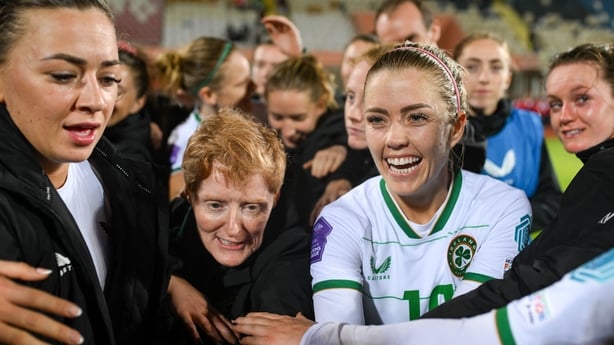In 2022, Marc Canham arrived at the FAI to take on the director of football role with a track record of tying strands together to build sustainable structures from grassroots level up.
On Monday, Eileen Gleeson became the first senior Republic of Ireland managerial appointment under his watch. As Canham talked up her credentials at the Aviva Stadium on Tuesday, the logic behind going for Gleeson was further crystallised.
Having spent five years working with the English FA and nine years with the Premier League, where he implemented a successful Elite Player Performance Plan, Canham is committed to the principles of joined-up thinking.
He doesn't want the senior team - or any team - to be out of sync with what's going on within the rest of the international infrastructure. Everybody must be on the same wavelength. It was a source of friction with Vera Pauw, who refused to change her approach to elements of training - strength and conditioning in particular.
Canham wants people who buy into the whole vision, and Gleeson ticks all the boxes in that regard.
Gleeson's title is 'head coach' rather than 'manager' - "there's a subtle but important difference" Canham stressed - and she will focus on the football side of the house. It'll be up to the wider support team, which will include Canham, to help establish a broader culture of consistency.
We don't yet know who else will be part of that setup, with the future involvement of interim coaches Colin Healy, Emma Byrne and keeper coach Richie Fitzgibbon still unclear. Canham was uncommittal when asked about the trio on Tuesday.
"It was an interim structure so it was always the intention to be an interim process until the end of the campaign," he said.
"That all happened very quickly. We put them together quickly and they did an amazing job with Eileen. All credit to them and we thank them. We'll assess that over the next few weeks and into the new year and look at it."
"I think there is a bigger picture to just what we're doing with our teams." - Marc Canham
Elaborating on his own long-term strategy, Canham said: "We want to develop something with our teams called 'the Irish identity' or 'the Irish ID'.
"There are three key things in it: the green line, which is basically the consistency throughout the pathway, the way we play, the way we coach. There's also a third strand in that which we'll call 'always green', in which every player that comes into our care we will try and support while they are playing but also beyond playing make sure there are pathways.
"I think there is a bigger picture to just what we're doing with our teams. Everything we’re going to launch with our football pathways plan is about trying to create a structure and pathway for everyone to achieve their full potential.
"As it stands today there is obviously room for improvement in that but also huge potential in terms of what that looks like. The international element of that is a really big and important part, but not the only part."

Gleeson has earned her stripes to get to this point. As an aspiring manager in the early noughties the landscape for women's football was drastically different.
"I can remember 28 years ago driving players to training when Noel King was the [Ireland] manager because they didn't have a lift to get there," she reflected.
"So you were nearly like their second parent, you experience that with them. Some of those players are still playing now.
"It was always about volunteers. I'd a moped and a bag of balls at St James' Gate. At that time we had Katie Taylor, Sue Byrne, players that are stalwarts of the game now and we trained on a pitch that was 20 yards by 30 yards. You'd roll your ankle just walking on it.
"All of these things, they build your love. They are fun when you look back on it. That's where you build your resourcefulness."
She's a long way from mopeds and bobbly pitches now. Ireland have made tremendous progress in terms of improving standards and raising the profile of the women's game. There's a serious appetite among the squad to maintain that momentum, with both Canham and Gleeson acknowledging qualification for major tournaments needs to become the norm.
The next stage in that cycle, they hope, will start in April when the qualifiers for Euro 2025 commence.
"We are absolutely committed to wanting to achieve success now and in the future," said Canham.
"We have a great chance [of making it to the Euros], we know if we finish in the top two [of their qualifying group] we are straight through; if we finish below that, we’re in a play-off.
"We have as good a chance as any we’ve had and we’ll get to play against good opposition which will be great for our development, which will be great for our success."


